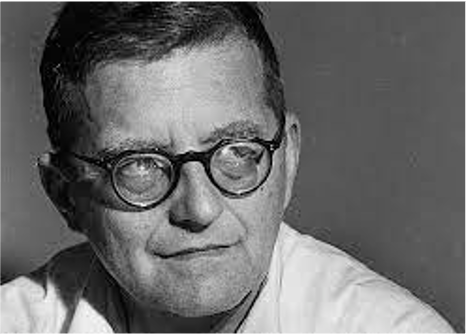


One of Russia's most acclaimed but also most debated composers, with many inventive works such as the legendary "Symphony 7", "Piano Concerto No 2", "The Gadfly", "Symphony 5" and the "JazzSuites".
As a kid, Shostakovich did not manifest some early talent and had a normal childhood. He learned to play the piano from his pianist mother and eventually became an awarded pianist.
Born in pre-revolutionary Russia, he lived through the 1917 revolution and the aftermath and began composing in the mid 1920s. His music often brought him in conflict with the Soviet communistic regime as he often defied the governmental rules of how music should sound like; he was often denounced by the Soviet regime and his music censored. It was like Shostakovich walking on a stretched rope, risking his life and freedom through his compositions. Throughout his life, Soviet censors were looking for the meaning behind his music to understand whether he was pro-Soviet or anti-Soviet. We may never know the answer to this question. But if we believe the memoirs of Shostakovich, published under the title "Testimony" by his friend musicologist Solomon Volkov, Shostakovich was an anti-Soviet, and what he was unable to express through words, he expressed through his music, sometimes lyrical but other times mocking and ironic.
One of Shostakovich's most important compositions is Symphony 7 or "Leningrad Symphony", which was the masterpiece which gave him international recognition not only for its musical qualities but also for its immense historical value, as it was literally composed while Leningrad was under siege by the Germans. Shostakovich was among the civilians and helped to put out fires during bombardments while composing his seventh symphony. Through its sounds, the symphony dramatises and immortalises the German invasion and creates images for allied resistance and final victory. It therefore became a symbol of resistance to fascism and totalitarianism and is a testament of the death of 27 million Soviet people during World War II.
Shostakovich was usually very nervous, always fidgeting and twitching his face nervously. He was also shy, as he hated having to talk to people he did not know.
In his personal life, following the death of his first wife, Nina, with whom he fathered 2 children, he married two more times.
His music is a kind of a melting pot, as he was mixing not only classical music with other music styles, such as jazz, but also elements of different music periods, as well as instruments you might not expect in the orchestra, such as the use of four saxophones, guitar and accordion. His compositions included not only complex works but also many film scores and popular culture music. It is for this reason that Shostakovich's music has received a lot of criticism for its lack of depth and quality. But in the last 20 years, there has been a growing wave of enthusiasm and recognition for his music. One thing is sure about Shostakovich's music: it told stories, although we are not always sure what these stories are.